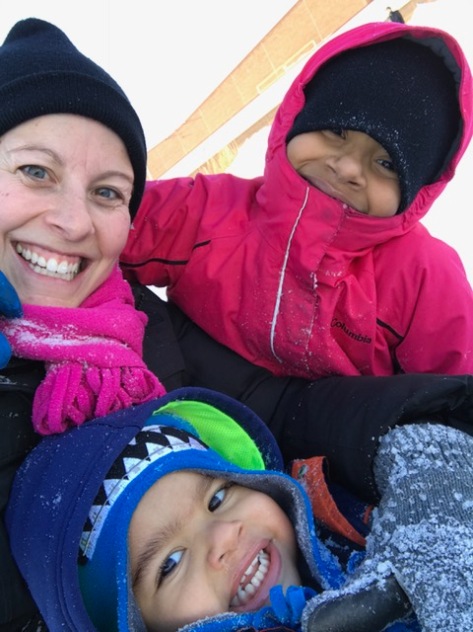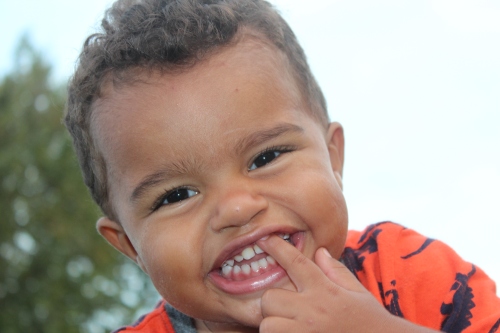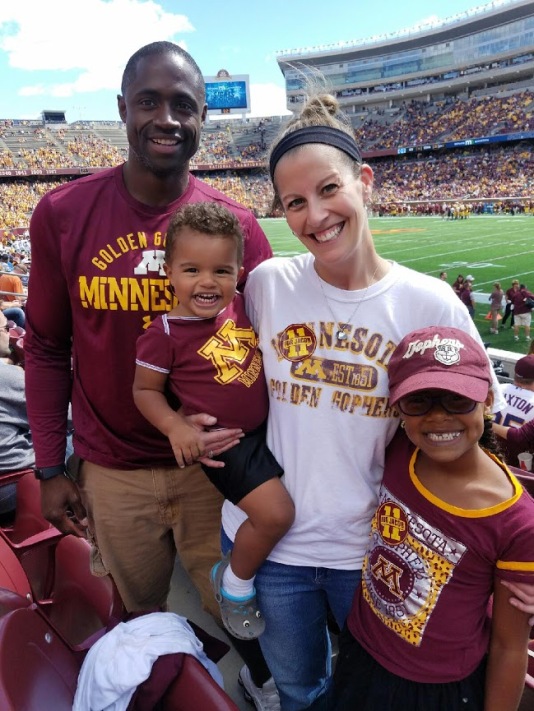To get a driver’s license, you have to take a course and pass two tests, one written and one practical. To be a teacher, you need a master’s degree and years of specialized training, academic and on-the-job. To do the hardest, most important job on the planet — parenting — there are no requirements. None. Zip. No required preparation of any kind. No training. No test. You’re on your own. The first time I ever held a baby, I was six months pregnant with my first child.
I spent this past weekend with family in a house with a young mom, Jennifer, her eight-year-old daughter Jayda, and her two-year-old son Jase. I saw firsthand the tremendous advantage of training for parenthood. Jennifer had been a grade school teacher, trained in early childhood behavior and education. She is now a principal in an elementary school.
She was the best parent I’ve ever seen. She had mad skills!

Jennifer had clearly studied child development and the best ways to handle young kids. She stayed mellow whatever was going on, so she was able to use her knowledge. In nearly three days, I never saw her lose her temper — or even her cool.
She was amazingly consistent with both children. Consistency is critical and was something I could never achieve. Every time Jase did something he wasn’t supposed to, like throwing something, he got a matter of fact, short time out. No drama, no anger. When told he needed a time out, he said “Yes, Mama” and went quietly.

Jennifer knew how to distract and redirect a hyper-active and sometimes antsy toddler. Jase never reached the point of meltdown and neither did anyone else. He went down for naps and to bed without fuss because Mom was gentle but firm. She made it clear that there was no negotiation possible.
She also managed to spend time with Jayda. She got the two kids to interact peacefully. There was no sibling rivalry or fights for Mom’s attention. Peace reigned for more than 48 straight hours with only a few short bouts of toddler tears. In defense of all other mothers reading this, this child was an angel with a wonderful, happy disposition. He also had other relatives around to help entertain him.
But I could see in Jennifer’s actions textbook child-rearing techniques I’d read about. I believe those techniques and knowledge let Jennifer feel confident and in control. This, in turn, allowed her to stay calm and handle situations rationally and intelligently. She spread the calm to her kids. It was awesome. Humbling to watch.

I was a good parent but I had an ideal in my head to which I was never able to attain. Jennifer embodied that ideal. I’m sure she has the innate temperament to be a wonderful mother. But I’m also sure she was helped by the practical tools her training gave her. They made it possible for her to reach the goal of most parents: to be the best parent we can be.
We can all use all the help we can get!
Categories: Childhood, Mother and motherhood, Parenting and parents, Personal




Reblogged this on Truth Troubles: Why people hate the truths' of the real world.
LikeLike
Very good article.
LikeLike
Reblogged this on PenneyVanderbilt.
LikeLike
Thank you for reblogging! It means a lot to me that people are sharing my blogs with people outside the Serendipity community. And this is such an important issue. People are chosing to become parents later in life these days so there is plenty of time and opportunity to get some understanding of child development and child management before having a child. I think it just doesn’t occur to people that they need it. Parenting is supposed to be ‘instinctual’ somehow, not something that requires any advanced training. Wrong!
LikeLike
Wow, what a great post. For more than 30 years, I worked with adult clients still suffering from their parents’ lack of training and education about how in the world to raise them. (Of course, many of my clients were also healing from serious abuse from parents who did not deserve that title in the first place.)
I’m forwarding your post to my Mentor/Auntie/Friend Jean Illsley Clarke, an amazing, world-renown Parent Educator. (She is in Minnesota and will love the photos!)
Here’s a post I wrote about her a while back for the theme Admiration.
https://chosenperspectives.wordpress.com/2016/04/30/admiration-for-my-teachermentorauntie/
Thanks so much for your insightful words! Really, I hope this spreads!!!
LikeLike
Thank you so much for passing my blog on to your Mentor. She sounds awesome. I’m flattered!
LikeLiked by 1 person
You are so welcome!
LikeLike
Couldn’t agree more! Besides having my own parenting blog, making my own mistakes, and being a family mediator and attorney, I see it all when it comes to parenting. Being a parent is the hardest job of all. If only we could all have training before we become one.
http://www.mamamakesmistakes.com
LikeLike
It’s sad because the ‘training’ is really not that hard. If you learn even the basics of child development and child psychology, you’re ahead of the game. Maybe people would seek out some pre parenting ‘training’ if they understood how much easier parenting would be if they had some knowledge going into it.
LikeLike
There’s something to be said that there was something in her that made her want to be a teacher–she was motivated and engaged from the start. I do like the idea that teachers make great parents. And she sounds like a gem.
LikeLike
Good point – Jennifer may have had the temperment to be both a great teacher and mother, which is why she chose both roles for herself. But I watched her utilize her knowledge of strategies for handling kids. Good temperment helps, as does a lot of patience, but the ‘tricks of the trade’ really help a lot. That knowledge gives a parent a sense of confidence and control that many parents never have.
LikeLiked by 1 person
Great post! Sharing… 🙂
LikeLike
Thanks! Very proud that this great family is part of my extended family.
LikeLike
I totally agree, Ellin. It should start in grade school. The only experience most of us have is from our own parents and that isn’t always the ideal. Hopefully there have been some advances in thinking on the subject and those should be passed on to us. We need all the help we can get.
Leslie
LikeLike
I was thinking some basic child development, child management classes in high school. Maybe along with the gimmick where you have to keep the doll with you or the egg unbroken for a certain amount of time. Not necessarily a full semester, but at least a few sessions. Some role playing exercises would be helpful to illustrate certain techniques like distraction and redirection. Also some explanations of what kids can understand and are capable of doing at certain ages so parental expectations are reasonable. My ex could never understand that kids were not mini adults from the age of two or three.
LikeLiked by 1 person
It should be in High School for sure. But you could bring basic care to the younger kids in public school. They may have a younger brother or sister and they could be taught some caring techniques and safety issues in health class.
Leslie
LikeLike
I think the child care ‘classes’ should be for the older kids in high school who can better understand and remember some of the key points about child development and management techniques.
LikeLiked by 1 person
If the younger kids have little brothers or sisters, it would make a good start.
LikeLike
It’s the toughest job you’ll ever love!
LikeLiked by 2 people
Very illuminating piece, Ellin. During the course of my professional life, I would often receive compliments from parents about my “difficult” work. I’d smile, accept the compliments and then tell them I thought THEY had the HARDEST job around, one that receives little praise. The only time parents seem to receive media attention is when something goes wrong.
I’ve always been in awe of those with good parenting skills. In retrospect, I can appreciate all that Mom and Dad did for the 3 Armstrong boys. It couldn’t have been easy.
LikeLike
I was a stay at home Mom and I loved every minute of it. My career women friends would ask me if I got bored. I looked at them like they were crazy. It’s the most exciting and rewarding, non-stop job on the planet!
LikeLiked by 1 person
Very nice piece about a very serious topic….
LikeLiked by 2 people
Thank you! I try to deal with important issues but with a light touch, most of the time.
LikeLike